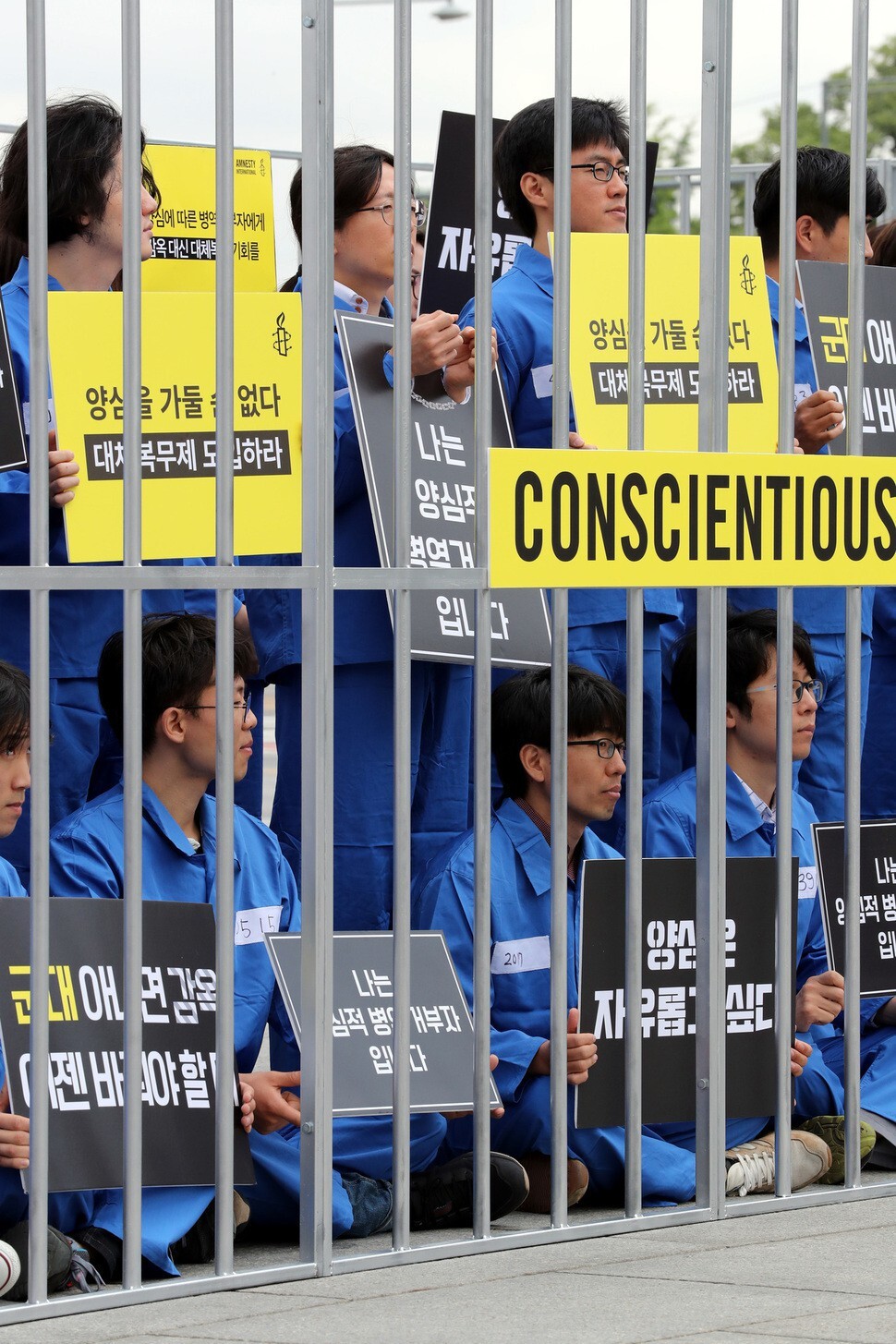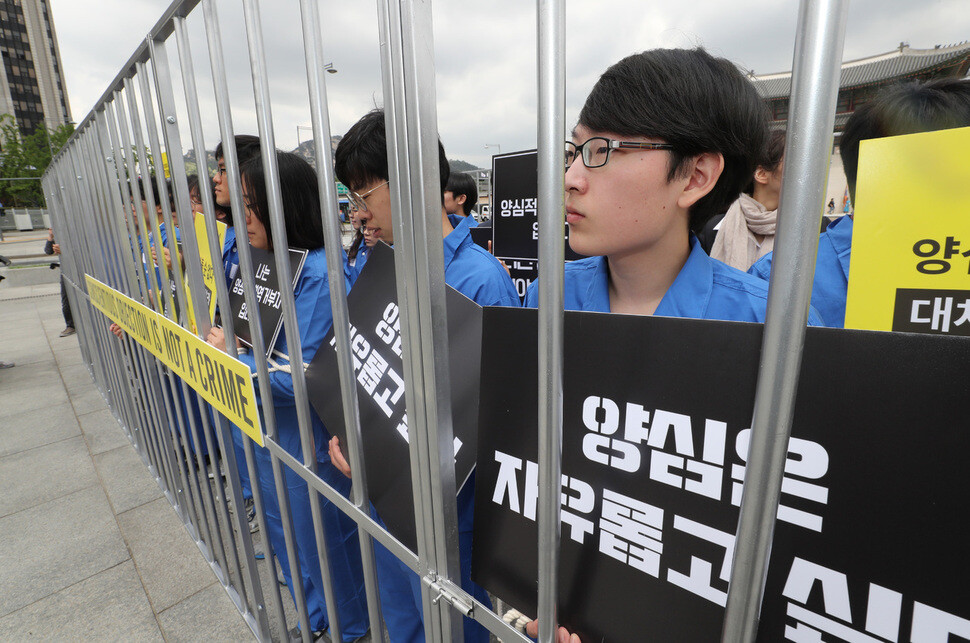hankyoreh
Links to other country sites 다른 나라 사이트 링크
Three more conscientious objectors found not guilty

On June 8, the Gimcheon branch of the Daegu District Court found three men who had been indicted not guilty for their conscientious objection to military service. That makes 13 conscientious objectors who have been found not guilty this year. Of the 30 cases in which conscientious objectors have been cleared of charges since the first such case in 2004, close to half have occurred this year. With the Constitutional Court delaying its decision on conscientious objection and the government and lawmakers hesitating to introduce an alternative military service system, judges at district courts appear to be using not guilty verdicts to emphasize the need for a social consensus.
Lee Hyeong-geol, a senior judge at the Gimcheon court, acquitted three individuals, including a 21-year-old surnamed Jeong, who had been charged with violating the Military Service Act by failing to enroll in the military after being ordered to report for duty. “When the state forces those who refuse to serve in the military because of their conscience to submit to a prison sentence while making no effort to come up with an alternative that would guarantee their basic rights, the result is an unjust infringement of the freedom of conscience,” Lee wrote in his verdict.
The Military Service Act and Reserve Forces Act make it criminal to not report for duty or training without a “legitimate reason.” As a result, the point of contention in conscientious objection trials is whether freedom of conscience can be recognized as a “legitimate reason.” The judges who have acquitted conscientious objectors in 13 trials this year (through June 8) have marshalled various evidence, including interpretations of the freedom of conscience in Article 19 of South Korea’s Constitution, international human rights norms and the situation both in South Korea and overseas, to conclude that conscience is a legitimate reason for refusing military service.
When Lee Hyeong-ju, presiding judge at the Seoul Eastern District Court, found a 22-year-old surnamed Cho not guilty on May 24, he cited a decision made by the National Human Rights Commission on Nov. 28, 2016: “The interpretation that the conscience is not a legitimate reason for objecting to military service infringes upon the Constitutionally guaranteed freedom of conscience by treating the freedom of conscience as an inferior value, even though it is superior to the duty of defending the country.” Lee explained that he had convicted 16 conscientious objectors between 2005 and 2012 but that he had reversed his stance in this case. “This ruling emphasizes that treating the conscience as a legitimate reason for refusing to serve in the military is not a legal opinion only held by some judges but rather a conclusion reached by the National Human Rights Commission, a state body,” he said.
It’s estimated that 18,000 people have been prosecuted for conscientious objection in South Korea. International human rights bodies have consistently urged the South Korean government to allow conscientious objection. But the courts, lawmakers and the government have all been slow to resolve the issue. The courts routinely sentence conscientious objectors to one year and six months in prison. The Constitutional Court has upheld the Constitutionality of legal provisions about conscientious objection on two occasions, and its third decision on the matter has been pending for six years. The Defense Ministry announced the adoption of an alternative service system in 2007, during the administration of President Roh Moo-hyun (2003-08), but this plan was canceled one year later, under President Lee Myung-bak (2008-13). Bills for an alternative service system that were submitted during the 18th and 19th sessions of the National Assembly failed to pass as well.
Under these circumstances, judges in district courts have been calling for change, arguing that protecting minority rights should not be left to the will of the majority. “We have no choice but to keep an eye on trends in public opinion about the sensitive subject of the military. The Constitutional Court is supposed to take the lead in protecting minorities, and the government and lawmakers will not take action until the court makes a ruling,” said Oh Du-jin, an attorney who represents conscientious objectors. Kim Yi-su, nominee for president of the Constitutional Court, said during his hearing that “this cycle of prosecution of conscientious objectors needs to be corrected,” and President Moon Jae-in has also pledged to introduce an alternative service system.

By Kim Min-kyung, staff reporter
Please direct questions or comments to [english@hani.co.kr]

Editorial・opinion
![[Column] Park Geun-hye déjà vu in Yoon Suk-yeol [Column] Park Geun-hye déjà vu in Yoon Suk-yeol](https://flexible.img.hani.co.kr/flexible/normal/500/300/imgdb/original/2024/0424/651713945113788.jpg) [Column] Park Geun-hye déjà vu in Yoon Suk-yeol
[Column] Park Geun-hye déjà vu in Yoon Suk-yeol![[Editorial] New weight of N. Korea’s nuclear threats makes dialogue all the more urgent [Editorial] New weight of N. Korea’s nuclear threats makes dialogue all the more urgent](https://flexible.img.hani.co.kr/flexible/normal/500/300/imgdb/original/2024/0424/7317139454662664.jpg) [Editorial] New weight of N. Korea’s nuclear threats makes dialogue all the more urgent
[Editorial] New weight of N. Korea’s nuclear threats makes dialogue all the more urgent- [Guest essay] The real reason Korea’s new right wants to dub Rhee a founding father
- [Column] ‘Choson’: Is it time we start referring to N. Korea in its own terms?
- [Editorial] Japan’s rewriting of history with Korea has gone too far
- [Column] The president’s questionable capacity for dialogue
- [Column] Are chaebol firms just pizza pies for families to divvy up as they please?
- [Column] Has Korea, too, crossed the Rubicon on China?
- [Correspondent’s column] In Japan’s alliance with US, echoes of its past alliances with UK
- [Editorial] Does Yoon think the Korean public is wrong?
Most viewed articles
- 1‘We must say no’: Seoul defense chief on Korean, USFK involvement in hypothetical Taiwan crisis
- 2N. Korean delegation’s trip to Iran shows how Pyongyang is leveraging ties with Moscow
- 3‘Weddingflation’ breaks the bank for Korean couples-to-be
- 4Korea sees more deaths than births for 52nd consecutive month in February
- 5[Column] Park Geun-hye déjà vu in Yoon Suk-yeol
- 6Will NewJeans end up collateral damage in internal feud at K-pop juggernaut Hybe?
- 7[Column] Has Korea, too, crossed the Rubicon on China?
- 8Amnesty notes ‘erosion’ of freedom of expression in Korea in annual human rights report
- 9Samsung barricades office as unionized workers strike for better conditions
- 10[Column] The clock is ticking for Korea’s first lady